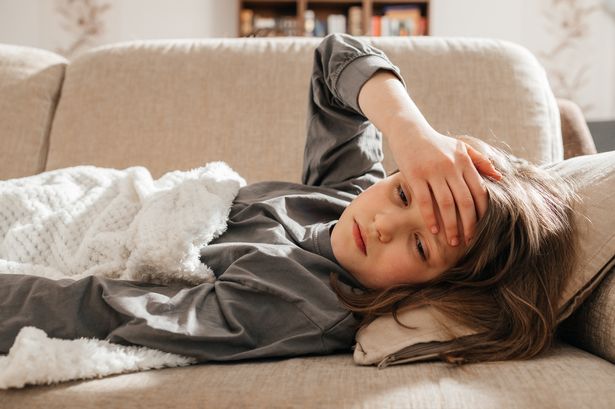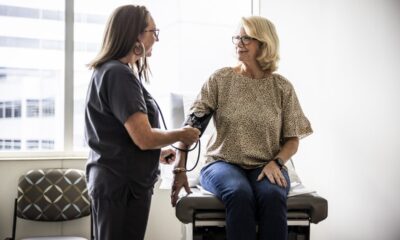World
Parents Urged to Keep Children Home During Chickenpox Outbreak

A medical expert is advising parents to keep their children home if they exhibit symptoms of chickenpox. Dr. Pallavi Bradshaw, the deputy chief medical officer at AXA Health, emphasizes the importance of isolation to prevent the spread of this contagious virus. Her guidance comes as the NHS prepares to launch a new vaccination programme in England that will offer a combined MMRV (measles, mumps, rubella, and varicella) vaccine to children during routine GP visits starting next year.
Many parents have traditionally believed that allowing children to contract chickenpox naturally is beneficial. Some even organize “chickenpox parties” with the intention of exposing their children to the virus for lifelong immunity. Dr. Bradshaw has described this practice as “outdated” and potentially “dangerous.”
“Deliberately exposing children to the chickenpox virus through chickenpox parties is not only an outdated practice but can be extremely dangerous,” Dr. Bradshaw stated. She pointed out that while many cases of chickenpox are mild, the virus can lead to severe health complications, including skin infections, pneumonia, and neurological issues, particularly in children with weakened immune systems.
Dr. Bradshaw underscored that vaccination is the most effective means of protecting children against chickenpox. She described the government’s upcoming vaccination programme as a vital step in safeguarding children’s health. “While we wait for the national vaccination programme to be rolled out, understanding the symptoms, dangers of pox parties, and proper procedures for managing chickenpox is essential,” she added.
Recognizing the early signs of chickenpox is crucial for parents. Symptoms typically manifest one to two days prior to the appearance of the characteristic rash. Dr. Bradshaw noted, “Flu-like symptoms can appear one to two days before a rash forms on the skin.”
Parents should remain vigilant for early symptoms of chickenpox, which may include fever, fatigue, loss of appetite, and headache. Should a child develop chickenpox, Dr. Bradshaw advises keeping them at home until they are no longer contagious. “Even if your child starts to feel better, they can remain contagious for up to a week after the rash first appears,” she explained.
Children should be kept out of school and away from public spaces until they have stopped developing new chickenpox spots and all blisters have crusted over. Dr. Bradshaw recommends that children stay home until:
– They have no new spots for 24 hours.
– All existing blisters have dried and crusted over.
As the NHS prepares for the rollout of the new vaccination programme, Dr. Bradshaw’s advice highlights the critical need for parental awareness regarding chickenpox. Keeping children isolated during illness not only protects their health but also safeguards the wider community from potential outbreaks.
-

 Entertainment3 months ago
Entertainment3 months agoAnn Ming Reflects on ITV’s ‘I Fought the Law’ Drama
-

 Entertainment4 months ago
Entertainment4 months agoKate Garraway Sells £2 Million Home Amid Financial Struggles
-

 Health3 months ago
Health3 months agoKatie Price Faces New Health Concerns After Cancer Symptoms Resurface
-

 Entertainment3 months ago
Entertainment3 months agoCoronation Street’s Carl Webster Faces Trouble with New Affairs
-

 Entertainment3 months ago
Entertainment3 months agoWhere is Tinder Swindler Simon Leviev? Latest Updates Revealed
-

 Entertainment4 months ago
Entertainment4 months agoMarkiplier Addresses AI Controversy During Livestream Response
-

 World2 weeks ago
World2 weeks agoBailey Announces Heartbreaking Split from Rebecca After Reunion
-

 Science1 month ago
Science1 month agoBrian Cox Addresses Claims of Alien Probe in 3I/ATLAS Discovery
-

 Health4 months ago
Health4 months agoCarol Vorderman Reflects on Health Scare and Family Support
-

 Entertainment4 months ago
Entertainment4 months agoKim Cattrall Posts Cryptic Message After HBO’s Sequel Cancellation
-

 Entertainment2 weeks ago
Entertainment2 weeks agoCoronation Street Fans React as Todd Faces Heartbreaking Choice
-

 Entertainment3 months ago
Entertainment3 months agoOlivia Attwood Opens Up About Fallout with Former Best Friend




















